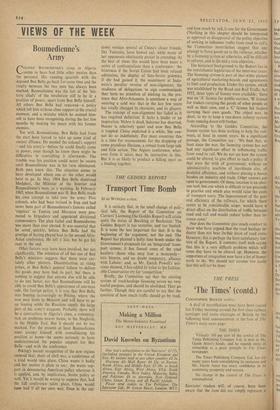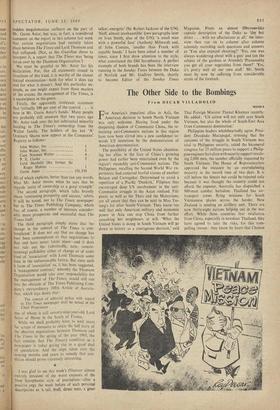THE PRESS
`The Times' (contd.)
CHRISTOPHER BOOKER writes: A deal of mystification must have been caused last Friday morning around the first-class railway carriages and rustic vicarages of Britain by the following bald announcement at the foot of The Tintes's main news page:
THE TIMES
Virtually 100 per cent of the control of The Times Publishing Company Ltd., is now in At Gavin Astor's hands; and he regards unity oi ownership as a, great strength to The Tinic, newspaper.
The Times Publishing Company Ltd. has 101 many years been consolidating its resources and Mr. Gavin Astor has every confidence in ii • continuing prosperity and success.
No change in the control of The Time contemplated.
Spectator readers will, of course, have been aware that the item did not simply represent :1 sudden megalomaniac outburst on the part of Mr. Gavin Astor, but was, in fact, a considered comment on the report in this column last week that certain negotiations had recently taken Place between The Times and Lord Thomson and had collapsed. (Not, as the Guardian chose to interpret it, a report that The Times was 'being taken over by the Thomson Organisation.') We must be grateful to Mr. Astor for his declaration. For, like all statements issued in situations of this kind, it is worthy of the closest textual examination—both for what it does say and for what it doesn't. And this particular ex- ample, as one might expect from those masters of the arcane, the management of The Times, is a masterpiece in the genre. Firstly, the apparently irrelevant statement that 'virtually 100 per cent of the control . . . is now in Mr. Gavin Astor's hands.' Many people are probably still unaware that two years ago Mr. Astor took over the last substantial minority holding in The Times's ownership from the Walter family. The holders of the key 'A' Ordinary Shares now appear at the Companies' Registry as follows:
John Walter, Jnr. 1 John Walter, Snr. 1 Capt. Norman Walter 4 P. E. Clarke 1 Lord Sheffield (the former Sir Roger Makins Gavin Astor All of which explains, better than can any words, what Mr. Astor means when he says that he regards 'unity of ownership as a great strength.'
The second paragraph, which talks bravely about 'continuing prosperity and success,' refers, it will be noted, not to The TimeS newspaper but to The Times Publishing Company, which has, of course, a number of interests consider- ably more prosperous and successful than The Times itself.
The third paragraph simply states that `no change in the control of The Times is con- templated.' It does not say that no change has ever been contemplated or that negotiations to that end have never taken place—and it does not rule out the (admitted!V, now, remote- seeming) ponibility either of change or of some kind of 'association' with Lord Thomson some time in the unforeseeable future. But even such it form of 'association' as, it has been suggested, a 'management contract,' whereby the Thomson Organisation would take over responsibility for the management of The Times, would still run into the obstacle of The Times Publishing Com- pany's extraordinary 108th Article of Associa- tion, which lays down that: The control of editorial policy with regard to The Timei newspaper shall be vested in the Chief Proprietors . . • One of whom is still seventy-nine-year-old Lord Astor of Hever in the South of France.
While we shall probably have. to wait years for scraps of memoirs to relate the full story of the abortive negotiations between Thomson and The Times in the spring of the year 1965, the fact remains that The Times's condition as a newspaper is today giving rise to a good deal of speculation. And the steps taken over the coming months and years to remedy that con- dition should prove extremely interesting.
I was glad to see this week's Observer almost entirely innocent of the worst excesses of the New Sycophantic style of journalism—after a positive orgy the week before of such personal descriptions as 'a tall, bluff, direct man, a great
1 356,830
talker, energetic' (Sir Robert Jackson of the UN), `bluff, almost inexhaustible' (two paragraphs later on Ivan Smith, also of the UN), 'a small man with a powerful face' (Anthony Milward) and, of John Cousins, 'smaller than Frank with capable hands.' I have been asked a number of times, since I first drew attention to the style, what constituted the Old Sycophancy. A perfect example of both brands has been the interview running in the Sunday Times between the Duke of Norfolk and Mr. Godfrey Smith, shortly to become Editor of the Sunday Times Magazine. From an almost Observer-like capsule description of the Duke as 'shy but direct . . . with no affectations at all,' the inter- view then ran on to column- after column solemnly recording such questions and answers as 'You also enjoyed shooting?"Yes, one was always wandering about with a gun' and (on the subject of the gardens at Arundel) 'Presumably you get all your vegetables from them?"Yes, it's pretty well all our own stuff.' Mr. Smith must by now be •suffering from considerable strain of the forelock.







































 Previous page
Previous page